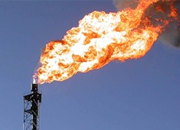Members include governments, oil producers and development organisations. Each year, around 140 billion cubic meters of associated gas are flared worldwide during oil production. That corresponds to around 30 percent of the gas consumed each year in the EU. At the same time greenhouse gases are also released: more than 300 million tonnes of CO2 worldwide.
“Using resources efficiently and combining long-term economic success with environmental and social responsibility have priority for Wintershall,” explains CEO Mario Mehren. To underline these goals, Wintershall has now joined the World Bank initiative as the largest internationally active German oil and gas producer.
Wintershall already met the goals of the initiative in 2012: since then the company has eliminated the flaring of associated gas during routine operations as operator and instead utilises this gas. All existing installations have already been upgraded, whereby the utilisation of associated gas is directly integrated into new facilities. Wintershall therefore already meets the highest international standards for the environmentally sustainable production of crude oil.
“With its No Flaring Policy, Wintershall has set a strong signal for responsible and sustainable business practices in recent years. Now we are using the opportunity to share our expertise in this area and to underscore our leadership role by joining the World Bank initiative,” says Mario Mehren.
By joining the World Bank initiative, Wintershall wants to encourage more companies and countries to participate. “We’re convinced that eliminating associated gas flaring can make an important contribution to mitigating climate change. We therefore welcome the World Bank’s initiative and are implementing its goals,” confirms Mehren.
Since 2012, Wintershall has eliminated the flaring of around 500 million cubic meters of associated gas per year. That corresponds to the annual gas requirement of major German cities like Hanover or Nuremberg. By eliminating flaring during routine operations, Wintershall is reducing CO2 emissions by up to two million tonnes each year. That represents around 60 percent of the previous total CO2 emissions produced by the company.
To achieve this, Wintershall has invested in innovative technology at the production sites and uses the associated gas in diverse ways. In Germany, the associated gas is used, for example, for generating electricity, heat and steam. In Libya, the energy generated is used for operating the oil production facilities and to generate electricity. These examples show how economic and environmental objectives can be reconciled.
03 Марта 2026 | вторник | 17:33


